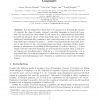Free Online Productivity Tools
i2Speak
i2Symbol
i2OCR
iTex2Img
iWeb2Print
iWeb2Shot
i2Type
iPdf2Split
iPdf2Merge
i2Bopomofo
i2Arabic
i2Style
i2Image
i2PDF
iLatex2Rtf
Sci2ools
116
click to vote
ALT
2008
Springer
2008
Springer
Iterative Learning of Simple External Contextual Languages
It is investigated for which choice of a parameter q, denoting the number of contexts, the class of simple external contextual languages is iteratively learnable. On one hand, the class admits, for all values of q, polynomial time learnability provided an adequate choice of the hypothesis space is given. On the other hand, additional constraints like consistency and conservativeness or the use of a one-one hypothesis space changes the picture — iterative learning limits the long term memory of the learner to the current hypothesis and these constraints further hinder storage of information via padding of this hypothesis. It is shown that if q > 3, then simple external contextual languages are not iteratively learnable using a class preserving one-one hypothesis space, while for q = 1 it is iteratively learnable, even in polynomial time. It is also investigated for which choice of the parameters, the simple external contextual languages can be learnt by a consistent and conservativ...
ALT 2008 | External Contextual Languages | Hypothesis Space | Machine Learning | One-one Hypothesis Space |
Related Content
| Added | 14 Mar 2010 |
| Updated | 14 Mar 2010 |
| Type | Conference |
| Year | 2008 |
| Where | ALT |
| Authors | Leonor Becerra-Bonache, John Case, Sanjay Jain, Frank Stephan |
Comments (0)

